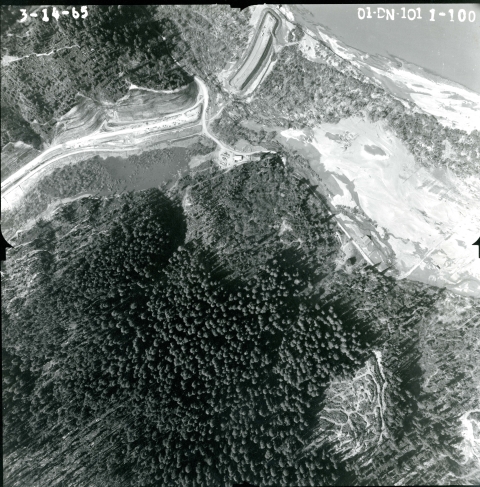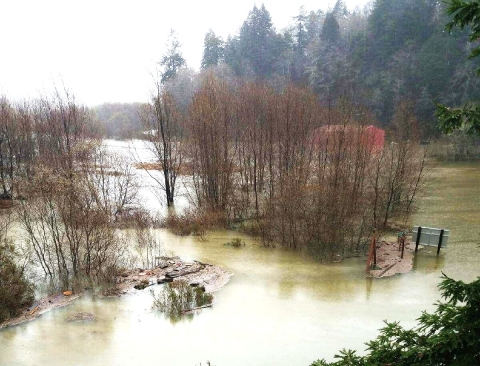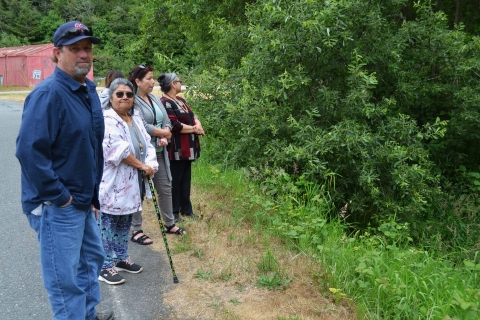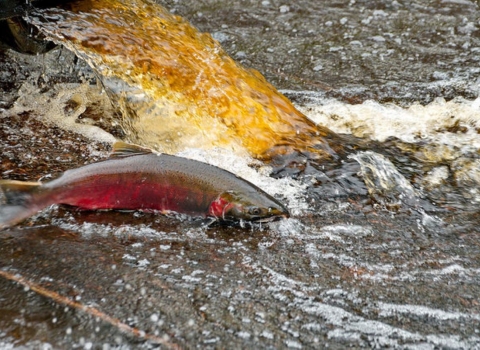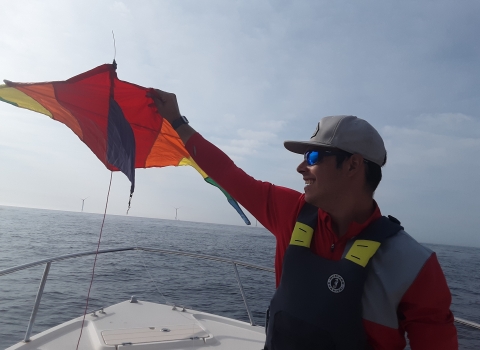This December marks the 60th anniversary of an historic and deadly event that occurred in northern California, impacting thousands of people, and forever changing several communities. It’s an event that Kathy Dowd, a member of the Pulikla Tribe of Yurok People (formerly the Resighini Rancheria in Del Norte County) distinctly remembers because of what happened when the rains began.
“It was the week before Christmas, and I was a young girl living with my family in a small community of about 40 Tribal citizens at the time. It was raining hard when I overheard my parents talking about a possible flood. My dad had gone to help neighbors move their livestock and trailer to higher ground. Another neighbor told my mom the road was about to overflow, that we needed to leave right then,” Dowd recalled. “A loud siren started to blow in the distance, and our mom told us to run and get in the car. We barely made it across Junior Creek before it flooded. My mom drove us to the neighbors on the hillside, and they let us stay in a small cabin until we could return home.”
The flooding left a huge swath of destruction across several North Coast counties, killing 29, causing millions in damage and isolating entire communities such as the Pulikla from the outside world for months. After the water receded and damages were assessed, most residents found their homes were completely destroyed in what became known as a record-breaking 1,000-year flood event. It was four years before Dowd’s family could move into a new home built for them in nearby Crescent City. However, the rebuilding of and return to the reservation took much longer.
Over the ensuing years, the community endured several more flood events, each leaving Dowd with equally harrowing memories. In 1974, her family had to race up a hill at night to escape the rapidly rising water coming up the steps to their cabin. “We heard an awful scream and with our little flashlights, saw a mountain lion going up the same hill. We decided to take our chances back in the cabin until neighbors came with their boat.” And in 1997 Dowd barely escaped another flood, which destroyed all of her personal belongings.
Each time the Pulikla community repaired Klamath Beach Road, and their lives to some extent, while anxiously wondering when - not if - the next flood would come. One of the reasons the reservation lands flooded so quickly, aside from the torrential rains, were two undersized culverts under the road which was the only way in and out of the residential area.
The Bipartisan Infrastructure Law (BIL) is a once-in-a-generation investment in the nation’s infrastructure and economic competitiveness. We were directly appropriated $455 million over five years in BIL funds for programs related to the President’s America the Beautiful initiative.
Learn more about Bipartisan Infrastructure Law . Credit: Susan Sawyer/USFWS
The culverts were originally designed to direct the flow of Waukell Creek and its tributary Junior Creek a few hundred yards to the Klamath River. But during high water events, debris piled up at the culvert entrances, creating a dam of sorts that backed up and pushed water over the creek banks and the low-lying road, effectively cutting off the only escape route for residents.
In the early 2000s, the Tribe began to advocate for funds to replace the two culverts, raise the road and construct a higher and more stable bridge over Waukell Creek. However, expenses and a lengthy permitting process kept the project out of reach, unable to move forward - until now.
In 2022, Pulikla Tribal Chairwoman Fawn Murphy submitted a funding proposal for the Waukell Creek and Junior Creek Culvert Replacement Project which was awarded $2 million from President Biden’s Bipartisan Infrastructure Law (BIL) through the U.S. Fish and Wildlife Service’s National Fish Passage Program, and $600,000 from the Klamath BIL funds. In 2023, with an additional $1 million awarded from the Klamath BIL, the Tribe finally had the necessary funding for the project to begin.
Chairwoman Murphy knew firsthand how critical replacing these culverts was to the future security of the Pulikla Tribal community.
“My mother was a little girl during the flood of 1964, so I grew up with her stories about the physical and emotional trauma they went through. In 1997, I was Tribal Secretary during another flood, and was concerned about the paperwork and historical documents stored in the Tribal office. I was told not to worry, that I didn’t need to take anything when we left that day,” said Murphy. “After a week of being trapped in my home without power, heat or enough food, I was able to return to the office. I will never forget walking in, looking up to the ceiling and seeing all our files stuck there. We couldn’t salvage anything from the office.”
When completed, installation of new, larger culverts will not only provide more security for the citizens of the Pulikla community but will also maximize fish passage fish passage
Fish passage is the ability of fish or other aquatic species to move freely throughout their life to find food, reproduce, and complete their natural migration cycles. Millions of barriers to fish passage across the country are fragmenting habitat and leading to species declines. The U.S. Fish and Wildlife Service's National Fish Passage Program is working to reconnect watersheds to benefit both wildlife and people.
Learn more about fish passage opportunities between the Klamath River estuary and critical salmonid habitats.
According to Greg Gray, habitat restoration biologist and BIL project coordinator in the Arcata Fish and Wildlife Office, Waukell Creek and Junior Creek are part of the network of Klamath River estuary sloughs and tributaries that provide vital freshwater rearing and winter refugia habitats for ESA-listed juvenile Coho salmon, steelhead trout, and coastal cutthroat trout. Gray said this project is unique in that it demonstrates a dedicated effort by the Service to support a local Indigenous community not just in terms of protecting their fisheries resources but also protecting their reservation.
“Over 90% of the Pulikla Tribal lands are located within the 100-year floodplain of the Klamath River, exposing them to periodic flooding and isolation during these high-water events,” said Gray. “The BIL funds provide a unique opportunity to couple fish passage for a listed salmon species with improving community resiliency in the face of climate change climate change
Climate change includes both global warming driven by human-induced emissions of greenhouse gases and the resulting large-scale shifts in weather patterns. Though there have been previous periods of climatic change, since the mid-20th century humans have had an unprecedented impact on Earth's climate system and caused change on a global scale.
Learn more about climate change . By removing the undersized culverts and elevating the reservation’s only roadway, this partnership will allow the Tribe to improve the long-term infrastructure and safety of their community while also setting the stage for salmon habitat restoration throughout their reservation."
The Pulikla Tribe is moving forward as quickly as possible implementing the project that has been in the planning stage for over a decade. Progress has been made on pre-construction tasks and work is expected to be completed in the Fall of 2025. For Kathy Dowd, it can’t happen soon enough.
“It’s been 60 years since the ‘big flood’ I experienced as a child. I’m 71 years old, and I have waited a long time for the road to get raised, the culverts to be replaced and for my community to be safe.”
For more information on Bipartisan Infrastructure Law funded projects in the Klamath Basin, please visit this interactiveStoryMap: Klamath Basin Restoration
For information on the U.S. Fish and Wildlife Service National Fish Passage Program please follow this link to the BIL project dashboard, search for Waukell and Junior Creeks Culvert Replacements Project.


